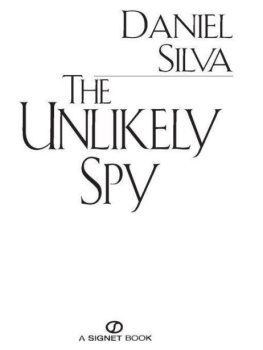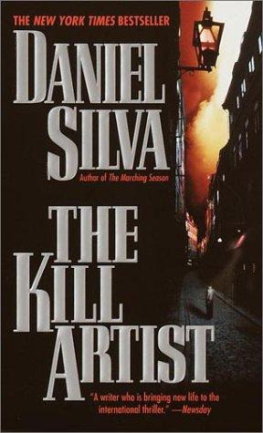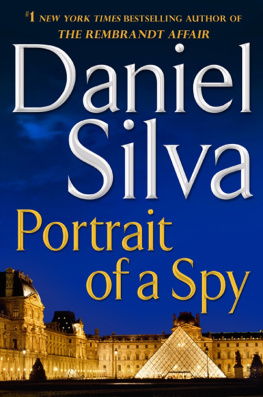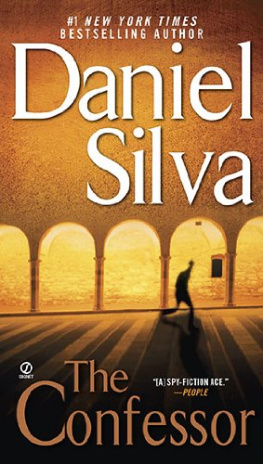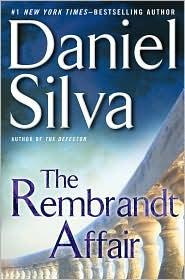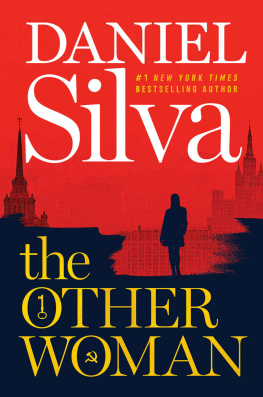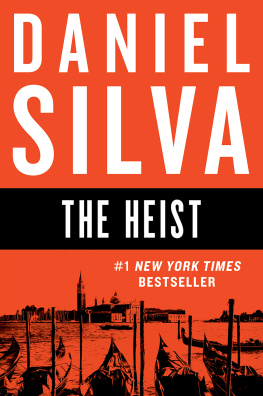The Messenger
A LSO BY D ANIEL S ILVA
Prince of Fire
A Death in Vienna
The Confessor
The English Assassin
The Kill Artist
The Marching Season
The Mark of the Assassin
The Unlikely Spy
The Messenger
DANIEL SILVA
G. P. P UTNAMS S ONS
N EW Y ORK
G. P. PUTNAMS SONS
Publishers Since 1838
Published by the Penguin Group
Penguin Group (USA) Inc., 375 Hudson Street, New York, New York 10014, USA Penguin Group (Canada), 90 Eglinton Avenue East, Suite 700, Toronto, Ontario M4P 2Y3, Canada (a division of Pearson Penguin Canada Inc.) Penguin Books Ltd, 80 Strand, London WC2R 0RL, England Penguin Ireland, 25 St Stephens Green, Dublin 2, Ireland (a division of Penguin Books Ltd) Penguin Group (Australia), 250 Camberwell Road, Camberwell, Victoria 3124, Australia (a division of Pearson Australia Group Pty Ltd) Penguin Books India Pvt Ltd, 11 Community Centre, Panchsheel Park, New Delhi110 017, India Penguin Group (NZ), Cnr Airborne and Rosedale Roads, Albany, Auckland 1310, New Zealand (a division of Pearson New Zealand Ltd) Penguin Books (South Africa) (Pty) Ltd, 24 Sturdee Avenue, Rosebank, Johannesburg 2196, South Africa
Penguin Books Ltd, Registered Offices:
80 Strand, London WC2R 0RL, England
Copyright 2006 by Daniel Silva
All rights reserved. No part of this book may be reproduced, scanned, or distributed in any printed or electronic form without permission. Please do not participate in or encourage piracy of copyrighted materials in violation of the authors rights.
Purchase only authorized editions. Published simultaneously in Canada
ISBN: 1-4295-3186-X
This is a work of fiction. Names, characters, places, and incidents either are the product of the authors imagination or are used fictitiously, and any resemblance to actual persons, living or dead, businesses, companies, events, or locales is entirely coincidental.
While the author has made every effort to provide accurate telephone numbers and Internet addresses at the time of publication, neither the publisher nor the author assumes any responsibility for errors, or for changes that occur after publication. Further, the publisher does not have any control over and does not assume any responsibility for author or third-party websites or their content.
For Phyllis and Bernard Jacob, for many years of
guidance, love, and support. And as always, for my wife,
Jamie, and my children, Lily and Nicholas.
The Saudis are active at every level of the terror chain, from planners to financiers, from cadre to foot soldier, from ideologist to cheerleader.
L AURENT M URAWIEC , RAND Corporation
Unless the ideological roots of the hatred that led to September 11 are addressed, the war on terrorism will not be won. It will be only a matter of time before the next Osama bin Laden emerges.
D ORE G OLD , Hatreds Kingdom
We will control the land of the Vatican. We will control Rome and introduce Islam in it.
S HEIKH M UHAMMAD BIN ABD AL -R AHMAN AL -A RIFI , Imam of the mosque at the King Fahd Defense Academy
Contents
PART ONE The Door of Death
1. London
2. Jerusalem
3. Jerusalem
4. Vatican City
5. Vatican City
6. Vatican City
7. Rome
8. Venice
9. Jerusalem
PART TWO Dr. Gachets Daughter
10. Ein Kerem, Jerusalem
11. London
Tel Megiddo, Israel
London
The Marais, Paris
The Marais, Paris
McLean, Virginia
Georgetown
London
London
London
London
PART THREE The Night Journey
Harbor Island, Bahamas
Off the Bahamas
Gustavia, Saint-Barthlemy
Gustavia, Saint-Barthlemy
Pointe Mangin, Saint-Barthlemy
Gustavia Harbor, Saint-Barthlemy
CIA Headquarters
Off Saint Maarten
Saint Maarten
Kloten, Switzerland
Zurich
Zug, Switzerland
Canton Uri, Switzerland
Canton Uri, Switzerland
Zug, Switzerland
Vatican City
Rome
PART FOUR The Witness
Washington
Tiberias, Israel
Paris: August
Istanbul: August
AUTHORS NOTE
ACKNOWLEDGMENTS
PART ONE
The Door of Death
London
I T WAS A LI M ASSOUDI who unwittingly roused Gabriel Allon from his brief and restless retirement: Massoudi, the great Europhile intellectual and freethinker, who, in a moment of blind panic, forgot that the English drive on the left side of the road.
The backdrop for his demise was a rain-swept October evening in Bloomsbury. The occasion was the final session of the first annual Policy Forum for Peace and Security in Palestine, Iraq, and Beyond. The conference had been launched early that morning amid great hope and fanfare, but by days end it had taken on the quality of a traveling production of a mediocre play. Even the demonstrators who came in hope of sharing some of the flickering spotlight seemed to realize they were reading from the same tired script. The American president was burned in effigy at ten. The Israeli prime minister was put to the purifying flame at eleven. At lunchtime, amid a deluge that briefly turned Russell Square into a pond, there had been a folly having something to do with the rights of women in Saudi Arabia. At eight-thirty, as the gavel came down on the final panel, the two dozen stoics who had stayed to the end filed numbly toward the exits. Organizers of the affair detected little appetite for a return engagement next autumn.
A stagehand stole forward and removed a placard from the rostrum that read: GAZA IS LIBERATED WHAT NOW ? The first panelist on his feet was Sayyid of the London School of Economics, defender of the suicide bombers, apologist for al-Qaeda. Next was the austere Chamberlain of Cambridge, who spoke of Palestine and the Jews as though they were still the quandary of gray-suited men from the Foreign Office. Throughout the discussion the aging Chamberlain had served as a sort of Separation Fence between the incendiary Sayyid and a poor soul from the Israeli embassy named Rachel who had drawn hoots and whistles of disapproval each time shed opened her mouth. Chamberlain tried to play the role of peacekeeper now as Sayyid pursued Rachel to the door with taunts that her days as a colonizer were drawing to an end.
Ali Massoudi, graduate professor of global governance and social theory at the University of Bremen, was the last to rise. Hardly surprising, his jealous colleagues might have said, for among the incestuous world of Middle Eastern studies, Massoudi had the reputation of one who never willingly relinquished a stage. Palestinian by birth, Jordanian by passport, and European by upbringing and education, Professor Massoudi appeared to all the world like a man of moderation. The shining future of Arabia, they called him. The very face of progress. He was known to be distrustful of religion in general and militant Islam in particular. In newspaper editorials, in lecture halls, and on television, he could always be counted on to lament the dysfunction of the Arab world. Its failure to properly educate its people. Its tendency to blame the Americans and the Zionists for all its ailments. His last book had amounted to a clarion call for an Islamic Reformation. The jihadists had denounced him as a heretic. The moderates had proclaimed he had the courage of Martin Luther. That afternoon he had argued, much to Sayyids dismay, that the ball was now squarely in the Palestinian court. Until the Palestinians part company with the culture of terror, Massoudi had said, the Israelis could never be expected to cede an inch of the West Bank. Nor should they. Sacrilege, Sayyid had cried. Apostasy.
Professor Massoudi was tall, a bit over six feet in height, and far too good-looking for a man who worked in close proximity to impressionable young women. His hair was dark and curly, his cheekbones wide and strong, and his square chin had a deep notch in the center. The eyes were brown and deeply set and lent his face an air of profound and reassuring intelligence. Dressed as he was now, in a cashmere sport jacket and cream-colored rollneck sweater, he seemed the very archetype of the European intellectual. It was an image he worked hard to convey. Naturally deliberate of movement, he packed his papers and pens methodically into his well-traveled briefcase, then descended the steps from the stage and headed up the center aisle toward the exit.


